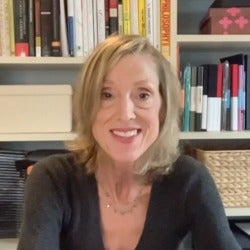In just a few short months, the COVID-19 pandemic has brought global health to the forefront of education in nearly every classroom, regardless of discipline or area of study. Educators across Harvard are making every effort to adjust their curriculum and courses to reflect these unprecedented times, and to support their students through the process. The Harvard Gazette recently interviewed CHDS Faculty Director, Professor Sue J. Goldie, to discuss the ways she has shifted her flagship General Education course, GENED 1063: World Health: Challenges and Opportunities, to demonstrate how educators can integrate and contextualize such an urgent global crisis into their learning goals. According to Professor Goldie, “We often race to the thing that’s right in front of us to teach. Coronavirus is there right now, and it’s a prime example of a great teaching topic. But I’ve also found that it is really important to teach about interrelated public health issues alongside the topic most at the forefront. I’ve been trying to integrate into my teaching not [only] a comparison of the disease itself, but a comparative of the entire social, political, economic context and encouraging the students to wrestle with that.”
Professor Goldie recently spoke as a panelist as part of Harvard Visitas, the university’s incoming student event series, to discuss the ways the course has been adapted to best support and amplify student learning through the transition to remote learning. The panel, “COVID-19: Harvard College Courses Addressing Urgent Problems and Reaching Beyond the Classroom” included professors from other health-focused courses in the General Education program, including Professors Allan Brandt, David Jone, Karen Thornber, and led by Professor David Cutler.
Speaking further about the opportunities and challenges of teaching in the time of COVID-19: “I think the biggest current challenge is to realize that the most difficult problems in front of us offer both tremendous risks to our societies but equally tremendous opportunities depending on how we seize them. In one month, there’s been this dramatic shift in what we can see in terms of changes in our climate from not doing so much damage for a few short weeks. In every single thing we look at, there is a possibility we also didn’t imagine. And I think that the students are embarking on a journey where this is their moment to both grow and to be able to not only imagine those things, but to actually contribute to achieving them.”
In addition to GENED 1063, Professor Goldie also taught the online course RDS 202: Decision Science for Public Health at the Harvard T.H. Chan School of Public Health with Senior Research Scientist Eve Wittenberg. Originally launched in Spring 2017, this course introduces students to the methods and applications of decision analysis and cost-effectiveness analysis in clinical and public health decision making. Materials include multimedia videos, on-line resources, discussion boards, and traditional homework exercises to build skills in decision analysis and economic evaluation methods.
More about Professor Goldie
Dr. Sue J. Goldie, Roger Irving Lee Professor of Public Health, is a physician, decision analyst, and public health scientist working to improve the health of vulnerable populations across the globe. Renowned for her scholarship in decision science, commitment to policy translation, and innovative approach to interdisciplinary education, Goldie serves as the Director of both the Global Health Education and Learning Incubator (Harvard University) and the Center for Health Decision Science (Harvard T.H. Chan School of Public Health).
Learn more: Read the full Harvard Gazette interview
Learn more: Watch the full YouTube panel discussion
Related news: Sue J. Goldie Presents “Foundations for Public Health”
Related news: Decision Science On-Line Course
